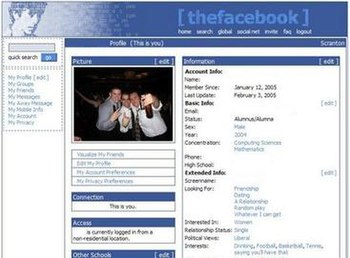Is There a Cyberstalker in Your Future?
 |
| Courtesy of Flickr |
By Carl Weiss
Does the title of this week's article creep you out? Good, because more and more intimate personal information is available online about each and every one of us than is "healthy." Worse still, it's all too easy to become a victim of cyberstalking. That's because most of us disseminate far too much personal information on social nets, in chat rooms, and via photo and video sharing services. It's also far too easy to get the vast majority of us to volunteer even more intimate details regarding our religious and political affiliations, income, sexual orientation, and health-related issues. Worst of all, there are companies and cybercriminals that profit from this glut of easily obtained information. The result? We're all putting our personal and financial futures at risk. In this article we'll show you how easy it is to glean reams of information about nearly anyone — and most importantly — what you need to do to keep yourself from getting caught with your pants down. And if that doesn't give you the e-heebie jebbies, I don't know what will.
The Age of Cyberstalking is Upon Us.
Like it or not, your privacy is mostly a thing of the past. Whether you’re an employee, are married, or have just ended a relationship, there are computer and mobile apps that make it all too easy for a third party to know a great deal of intimate knowledge about you. To exacerbate this issue, for just a few bucks, any cyberstalker can acquire a sophisticated array of software that make it child’s play to track your location in real time, and listen or look in on what you are doing and with whom you’re doing it.
| English: http://noalciberacoso.blogspot.com/ Español: http://noalciberacoso.blogspot.com/ (Photo credit: Wikipedia) |
While this sounds like a plot for a sci-fi movie or a novel, it has become all too real for the victims of this 21st century scourge. During the past few months, everyone from ex-boyfriends, to a Seattle police officer, have been prosecuted for spying on and/or posting sexually explicit photos of their former lovers online. Recently even children have been reported recently for using the Internet to cyberbully classmates … with sometimes tragic results.
The bad news is, despite recent legislation that can impose serious jail time for cyberstalkers, this is a crime that’s on the rise, currently affecting one in six women and ten percent of all men. The good news is there are steps you can take to defend yourself in this all too weird, wired world.
Facebook is Cyberstalker Central!
The news post that motivated me to write this blog was entitled, “7 Things You Told Facebook Without Realizing It.” Posted on April 29, 2014 by vox.com, the staggeringly detailed post detailed a number of nefarious apps, available to the general public, which are designed to trawl through Facebook to guess your income, your location, and your passwords. There are also apps that seek out men or women who have just ended a relationship, or even scout the social nets, for revealing photos. Like a virus, some of these apps are designed to jump from one posting to another, burrowing into your list of friends in orde
r to do the stalkers’ despicable deeds. Read -- "Things You told Facebook Without Even realizing it."
| Profile shown on Thefacebook in 2005 (Photo credit: Wikipedia) |
Of course, Facebook isn’t the only social net in vogue with cyberstalkers. And not all cyberstalkers are interested in seeing your swimsuit photos. A post from Technorati.com points out that Facebook, Twitter and FourSquare are now being used by burglars to zero in on vacationing families. The article points out that 75% of convicted burglars admitted that most criminals use social media to find homes to victimize, and they also admit to using Google Earth to case the neighborhood. Let’s see if the Neighborhood Watch programs can foil these high-tech thieves. Read how burglars are using social media to perpetrate crimes.
The problem with most people is that they post way too much personal information on social sites. Everything from where you live, to what you own, or where you are … these are often revealed in accurate detail (complete with photos). Then you casually post the fact you’re soon leaving on that two week vacation. Voila! Everyone in cyberspace not only knows how long you’ll be gone, but you announced you’ve actually left because you’ve shared photos of yourself at the airport waiting on your plane, to photos of your vacation each day you’re gone. If this sounds familiar, then don’t be surprised if, upon your return, you find your house and/or business has been rifled by thieves. (Heck, why not show the thieves where you keep the spare key?)
The Technorati piece goes on to advise readers that if they don’t want to be victimized while on vacation, they need to start by taking a vacation from using social media before or during any extended trip. They also advise you to consider sharing your vacation photos after the fact. The article advises readers to also tell their friends to avoid posting tidbits about themselves while they’re on their vacations, unless it’s to post the fact that they have a vicious watchdog.
You Can Easily Hurt the Ones You Love
| Illustration of Facebook mobile interface (Photo credit: Wikipedia) |
Even software that was originally designed to protect those we love can be co-opted into working for the bad guys. A blog on Motherboard.com pointed out that spy software and apps designed to help mothers keep tabs on their children has become popular fodder for those who wish to spy on others.
"We do have quite a large proportion of our customers who use mSpy specifically to catch a cheating spouse," mSpy communications director Tatiana Ameri told Komo News last year. Read – Tor is being used as a safe haven for victims of cyberstalking.
Even more chilling, the article points out there’s an entire online community that caters to those looking to spy on others.
"Digital communities have sprung up where individuals teach each other how to compromise cell phones to track the victim’s whereabouts, listen to conversations in a room, take pictures, and read texts and email so that they can learn about their victim’s behavior on a microscopic level."
The NSA Even Spies on Their Own Girlfriends
The above-mentioned article also points out that even spies at the NSA weren’t above using top secret surveillance tools to keep tabs on loved ones. The program was so pervasive that it even had its own Codename: LOVEINT. The revelation of this information so incensed Senator Chuck Grassley of Iowa that he petitioned the NSA to release information about LOVEINT. The information revealed that at least a dozen of the NSA’s best and brightest were implicated in the program.
| Headquarters of the NSA at Fort Meade, Maryland. Español: Instalaciones generales de la NSA en Fort Meade, Maryland. Русский: Штаб-квартира АНБ, Форт-Мид, Мэриленд, США (Photo credit: Wikipedia) |
Of course, for every spy there is a counterspy. And in the age of cyberstalking, there are a number of resources designed to help victims fight back. While many of these sites provide checklists designed to help you avoid becoming a victim of cyberstalkers, there are a few that take a more proactive approach. One of these is Tor Network, the same software employed by hackers, crackers, dissidents and whistleblowers to maintain online anonymity.
For several years, Tor, spearheaded by Tor Project executive director Andrew Lewman, has been tackling cyber stalking, working with domestic violence groups to set up countersurveillance programs to help victims evade online surveillance. The onion router can hide a victim’s identity long enough for them to research where to find help, and look up what data they can find about themselves without tipping off their stalker that they’re online, he said.
Remember that everything from your computer, to your smart TV, to your smart kitchen appliances can be used against you. Any smart device you have including your laptop, tablet and smartphone can be used to track your every move. Malware can be surreptitiously installed on any or all of these devices to allow a cyberstalker to take control of it, even to the point of activating the unit’s webcam. So aside from making sure you have one or more layers of software designed to detect and defeat spyware and malware, you personally also have to ensure you don’t make it easy for cyberstalkers to get you in their clutches.
In this article, I’ve outlined the rampant use of cyberstalking on the Internet via smart devices today. I’ve laid out the scary state of how cyberstalking is threatening our personal security because we don’t use social media in a diligent manner. I’ve provided details and links to several resources and information that can help the reader protect themselves, and listed steps they can take to increase their privacy and personal security. If you follow my advice, your chances of not being singled out for cyberstalking will increase substantially.
Hey! Anybody want to see pictures of my new Rottweiler?
If you like this article, you can find more by typing “security" or "Internet security” in the search box at the top left of this blog.If you found this article useful, share it with your friends, families and co-works. If you have a comment related to this article, leave it in the comment sections below. I hope you have found these questions and answers useful.
If you like this article, you can find more by typing “security" or "Internet security” in the search box at the top left of this blog.If you found this article useful, share it with your friends, families and co-works. If you have a comment related to this article, leave it in the comment sections below. I hope you have found these questions and answers useful.
If you would like a free copy of our book, "Internet Marketing Tips for the 21st Century," please fill in the form below and we will send you this free eBook. Your information is always keep private and never sold.
Carl Weiss is CEO of Working the Web to Win, a digital marketing agency in Jacksonville, Florida. You can interface with Carl every Tuesday at 4 p.m. Eastern when he airs his radio show on Blog Talk Radio.
Related articles







No comments:
Post a Comment